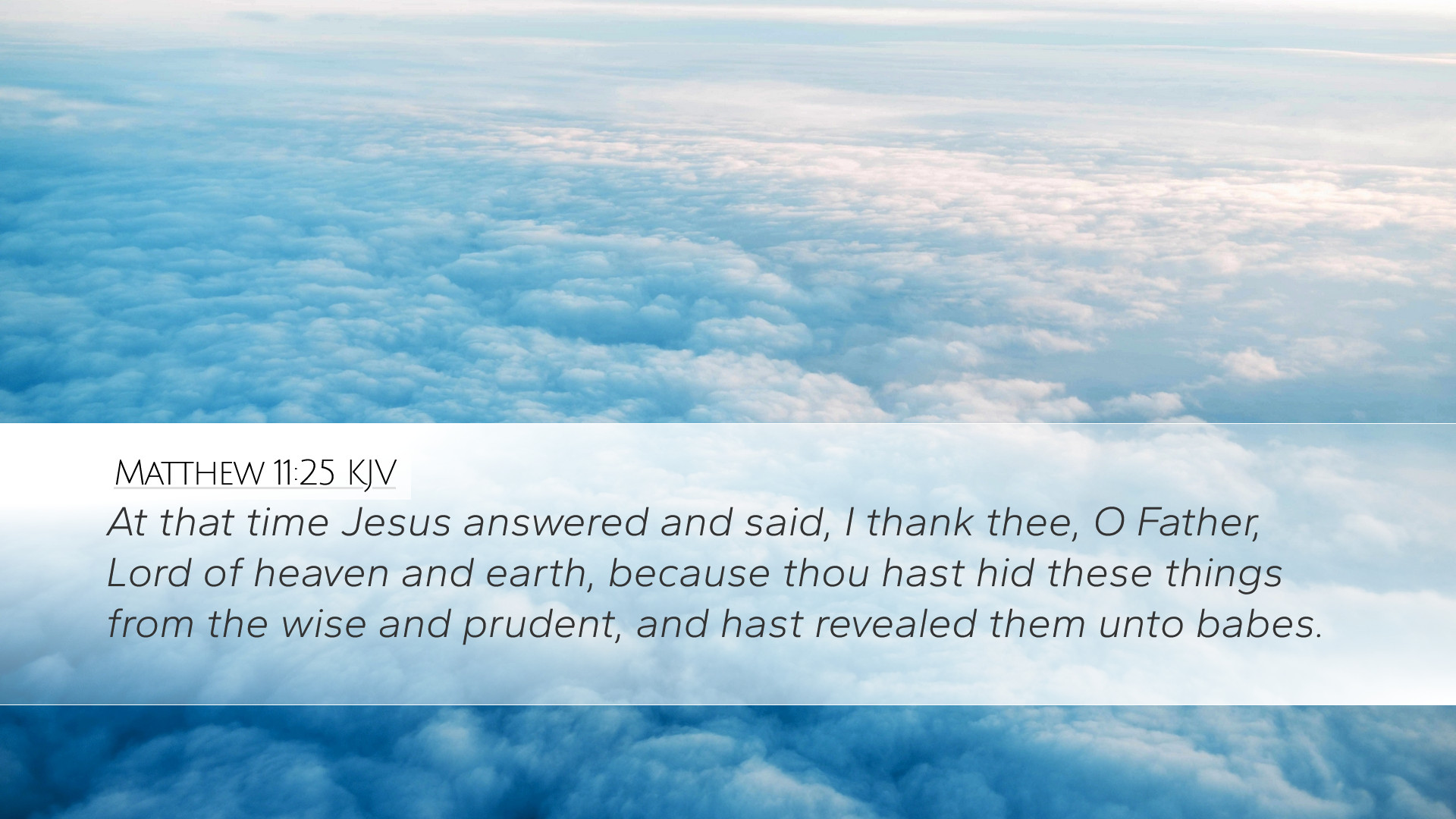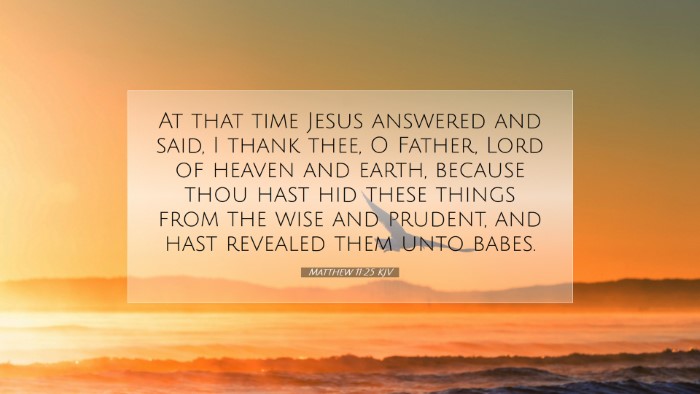Bible Commentary on Matthew 11:25
Bible Verse: “At that time Jesus declared, ‘I thank you, Father, Lord of heaven and earth, that you have hidden these things from the wise and understanding and revealed them to little children;’” (Matthew 11:25, ESV)
Introduction
In Matthew 11:25, Jesus offers a profound insight into the nature of divine revelation and the relationship between God and humankind. This verse serves as a critical junction in the Gospel narrative, connecting the preceding discourse about the unrepentant cities and the acknowledgment of divine mercy. Through the lens of public domain commentaries, we can draw out rich theological implications, the character of God, and humanity's position before Him.
Contextual Analysis
To fully appreciate Matthew 11:25, one must consider its immediate context. This passage unfolds in a broader discourse where Jesus laments over unrepentant cities despite the miracles performed there (Matthew 11:20-24). The themes of revelation and knowledge permeate through Christ's teachings, emphasizing God's sovereignty and grace in drawing people to Himself.
Matthew Henry's Commentary
Matthew Henry emphasizes the concept of God's sovereignty in disclosure. He notes:
- **God's Choice of Revelation:** Henry points out that God reveals His truths not to the intellectual elites but to those with childlike faith. This reflects a divine choice that subverts human expectations.
- **Praise for God's Sovereignty:** Jesus' gratitude to the Father highlights His acknowledgment of God’s sovereign will — that wisdom and understanding, as defined by the world, often blind individuals to spiritual truths.
- **Children as a Model of Faith:** The reference to 'little children' serves as a reminder of the humility, dependency, and openness to God that believers ought to embody. Those who are simplistic in their approach to faith can grasp truths that elude the wise.
Albert Barnes' Commentary
Albert Barnes expands on the ideas of humility and the divine choice in revelation. He asserts:
- **Hidden from the Wise:** Barnes interprets the 'wise and understanding' as those who rely on their intellect and pride, which can hinder spiritual insight. God’s revelations are not given to those who consider themselves self-sufficient in wisdom.
- **Revealed to Babes:** Children symbolize those who are humble, teachable, and aware of their need for guidance. Barnes aligns this with the beatitude in Matthew 5:3, stressing that the kingdom of heaven belongs to the humble.
- **An Invitation to Seek:** The statements before this verse invite listeners to come to Christ. This reinforces that understanding God’s will is less about intellectual attainment and more about relational connection with Him.
Adam Clarke's Commentary
Adam Clarke's perspective complements and deepens the understanding of this passage through the exploration of cultural and theological nuances:
- **Cultural Insights:** Clarke points out that the learned of Jesus’ time, including Pharisees and Sadducees, often misinterpreted the Scriptures. Hence, Jesus’ declaration serves as a critique of formalized religion that ignores spiritual realities.
- **The Nature of Spiritual Truths:** He emphasizes that spiritual truths must be embraced with the spirit of love and simplicity, rather than mere intellectual pursuit. This detachment from worldly wisdom is essential for genuine understanding.
- **Prayer and Thankfulness:** Clarke highlights that the verse is a prayer of thanks to God, illustrating the importance of acknowledging God's role in our understanding of spiritual truths. It is a reminder for believers to express gratitude for such revelations as a manifestation of grace.
Theological Implications
Matthew 11:25 raises several theological implications worthy of further reflection:
- **God’s Sovereignty and Grace:** The selective revelation of truth demonstrates God's sovereign choice. It reveals His grace that reaches out to the humble rather than excluding them due to their societal position.
- **Human Condition and Dependence:** The comparison between the wise and the little children illustrates a fundamental truth about the human condition; wisdom without dependence on God leads to spiritual blindness.
- **Faith as Simplicity:** The call to approach God with a childlike faith aligns with Jesus’ teachings throughout the Gospels, emphasizing that spiritual maturity involves simplicity and trust in God.
Conclusion
Matthew 11:25 is a powerful declaration of the nature of God’s revelation and the disposition required of those who seek Him. As discussed through the insights of Matthew Henry, Albert Barnes, and Adam Clarke, this verse challenges believers to abandon pride and adopt humility in their pursuit of divine truth. It emphasizes a God who reveals Himself not through human accolades or wisdom, but through grace bestowed on those who are willing to come to Him as children.


